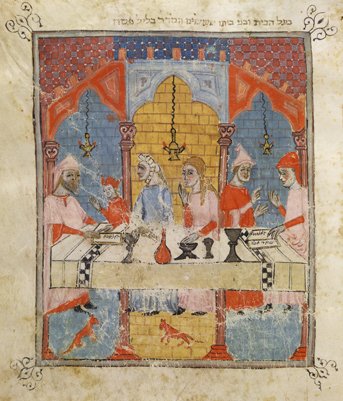St. John Chrysostom‘s Homily 84 on Matthew 26. 51-54.
And, behold, one of them which were with Jesus stretched forth his hand, and drew his sword, and struck a servant of the high priest’s, and smote off his ear.
Then said Jesus unto him, Put up again your sword unto his place, for all they that take the sword, shall perish by the sword. Thinkest thou that I cannot pray to the Father, and He shall presently give me more than twelve legions of angels? How then should the Scriptures be fulfilled that thus it must be?
Who was this one, who cut off the ear? John says that it was Peter. [John 18:10] For the act was of his fervor.
But this other point is worth inquiry, wherefore they were bearing swords? For that they bore them is evident not hence only, but from their saying when asked, “here are two”. But wherefore did Christ even permit them to have swords? For Luke affirms this too, that He said unto them, When I sent you without purse, and scrip, and shoes, lacked ye anything? And when they said, Nothing, He said unto them, But now, he that has a purse, let him take it, and a scrip, and he that has no sword, let him sell his garment, and buy one. And when they said, Here are two swords, He said unto them, It is enough.
Wherefore then did He suffer them to have them? To assure them that He was to be betrayed. Therefore He says unto them, Let him buy a sword, not that they should arm themselves, far from it; but by this, indicating His being betrayed.
And wherefore does He mention a scrip also? He was teaching them henceforth to be sober, and wakeful, and to use much diligence on their own part. For at the beginning He cherished them (as being inexperienced) with much putting forth of His power but afterwards bringing them forth as young birds out of the nest, He commands them to use their own wings. Then, that they might not suppose that it was for weakness He is letting them alone, in commanding them also to work their part, He reminds them of the former things, saying, When I sent you without purse, lacked ye anything? that by both they might learn His power, both wherein He protected them, and wherein He now leaves them to themselves by degrees.
But whence were the swords there? They had come forth from the supper, and from the table. It was likely also there should be swords because of the lamb, and that the disciples, hearing that certain were coming forth against Him, took them for defense, as meaning to fight in behalf of their Master, which was of their thought only. Wherefore also Peter is rebuked for using it, and with a severe threat. For he was resisting the servant who came, warmly indeed, yet not defending himself, but doing this in behalf of his Master.
Christ however suffered not any harm to ensue. For He healed him, and showed forth a great miracle, enough to indicate at once both His forbearance and His power, and the affection and meekness of His disciple. For then he acted from affection, now with dutifulness. For when he heard, Put up your sword into its sheath, [John 18:11] he obeyed straightway, and afterwards nowhere does this.
But another says, that they moreover asked, Shall we smite? [Luke 22:49] but that He forbad it, and healed the man, and rebuked His disciple, and threatened, that He might move him to obedience. For all they that take the sword, He said, shall die with the sword.
And he adds a reason, saying, Think ye that I cannot pray to my Father, and He shall presently give me more than twelve legions of angels? But that the Scriptures might be fulfilled. [Matthew 26:53-54] By these words He quenched their anger, indicating that to the Scriptures also, this seemed good. Wherefore there too He prayed, that they might take meekly what befell Him, when they had learned that this again is done according to God’s will.









